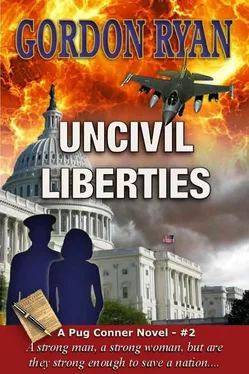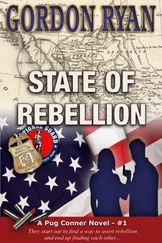Gordon Ryan - Uncivil liberties
Здесь есть возможность читать онлайн «Gordon Ryan - Uncivil liberties» весь текст электронной книги совершенно бесплатно (целиком полную версию без сокращений). В некоторых случаях можно слушать аудио, скачать через торрент в формате fb2 и присутствует краткое содержание. Жанр: Триллер, на английском языке. Описание произведения, (предисловие) а так же отзывы посетителей доступны на портале библиотеки ЛибКат.
- Название:Uncivil liberties
- Автор:
- Жанр:
- Год:неизвестен
- ISBN:нет данных
- Рейтинг книги:3 / 5. Голосов: 1
-
Избранное:Добавить в избранное
- Отзывы:
-
Ваша оценка:
- 60
- 1
- 2
- 3
- 4
- 5
Uncivil liberties: краткое содержание, описание и аннотация
Предлагаем к чтению аннотацию, описание, краткое содержание или предисловие (зависит от того, что написал сам автор книги «Uncivil liberties»). Если вы не нашли необходимую информацию о книге — напишите в комментариях, мы постараемся отыскать её.
Uncivil liberties — читать онлайн бесплатно полную книгу (весь текст) целиком
Ниже представлен текст книги, разбитый по страницам. Система сохранения места последней прочитанной страницы, позволяет с удобством читать онлайн бесплатно книгу «Uncivil liberties», без необходимости каждый раз заново искать на чём Вы остановились. Поставьте закладку, и сможете в любой момент перейти на страницу, на которой закончили чтение.
Интервал:
Закладка:
Rawlings and the task force had discovered one of life’s truths: no matter the fallacy of the origin or the deception perpetrated in the process, the end result was the determining factor in public acceptance of change. The decision of President Clarene Prescott, following the assassination of her predecessor, Bill Eastman, not to reveal the source or even the presence of a fraudulent election, put the final confirmation to the issue. Legally achieved or not, California was on the road to secession, and so far, no one in national power had agreed to use military force to stop it.
A month before the November 2012 presidential election, in an effort to broaden his understanding of America’s founding principles, Rawlings had contacted The Montclair Advocacy, a prestigious political think tank in California with a known conservative persuasion. Dan also solicited the assistance of other outside sources, including Horatio Julius, his former law professor at Stanford and a renowned constitutional scholar.
Several meetings with Professor Julius and principal officers and analysts at Montclair gave Rawlings an entirely new perspective. In fairly quick order, these learned scholars opened Dan’s eyes to various philosophical components of the existing national Constitution that were intended by America’s Founding Fathers, but which had been abandoned. More importantly, their presentation of how these various components of governance had become corrupted over the ensuing two centuries by the political adoption of progressive philosophy that was antithetical to the ‘natural, God-given rights’ theory had broadened Dan’s concept of central versus local governance. Constant bombardment by Glenn Beck and other conservative talk show hosts sealed the lesson.
The upshot was that after several months of study and analysis, Dan Rawlings, to his own surprise, had shifted his thinking, slowly becoming more open to the idea of secession as possibly the only way to truly start anew and restore the original principles. His approach was not directed at open, confrontational revolution, but instead, a reestablishment of the original founding concepts, thereby bringing America back to a nation based upon an equality of rights, rather than a nation striving for equality of condition, acquired at the expense of the more successful members of society.
After the presidential election, Dan had been contacted by several legislators from neighboring states, specifically Nevada, Arizona, and Oregon, who asked to meet with him to discuss California’s impending secession. He had agreed to their request, considerably encouraged by the fact that states he, and other political pundits, had assumed were solidly liberal in their thinking, including his own California, had suddenly developed a strong, vocal, moderate, if not conservative, voice.
When discussing the issue with his new wife, the former Nicole Bentley, a medically retired FBI agent Dan had met as a result of the presidential task force, he had expressed his feelings more openly.
“Nicole, I had no idea there were so many conservative thinkers in California. Even in other West Coast states.”
She’d laughed at his naivete. “Did you think that West Coast people were all airheads, part of the ‘anything goes’ crowd?”
Rebuffed, Dan joined in her laughter. “Maybe I did, despite my family’s long-standing conservative leanings. The media has duped me, I guess. They present their ideology as the ruling-and prevalent-philosophy.”
“My father told me something once, Dan,” Nicole continued. “Most conservative people are just that: conservative. They don’t advocate, press for change, rebel, or march in demonstrations. Not until they’re provoked. They are, in fact, what has been called the silent majority. But since they are silent, the liberals believe that because they’re not present, they don’t care, and the media promotes that perception. Then, when they do speak up, they’re called stupid because they can’t see the logic and intellectual superiority of the liberal position. Who do you think makes up the bulk of today’s Tea Party movement? No,” she said, shaking her head, “the conservatives are there. Just give them a reason to rear their head. Inform them, inspire them, and you’ll see the result. I think they’ve finally had enough of the ‘some work, all benefit’ attitude, the stereotypical one-sided liberal view of equality for all.”
On the flight to Las Vegas to meet with the other legislators, Dan recounted Nicole’s remarks while she cat-napped. The growth of the meeting, eight states now being represented, was ample evidence of her reasoning. Or was it? Notwithstanding a public display of a more openly conservative philosophy, both in rhetoric and action in their respective state legislative matters, these other elected state legislators had requested their meeting be held in confidentiality and had suggested they meet in late January, after the presidential inauguration. Were they ashamed of their involvement? That would become apparent soon enough, Dan thought as the plane began its descent into McCarran Airport.
By the time of the meeting, five additional western states-Alaska, Idaho, Montana, New Mexico, and Utah-had joined the convocation, and what later became known as the First Vegas Gathering was convened. To date, they had successfully kept their planned assembly low-key, confidential, and, at last count, limited to approximately thirty individuals, all current or former elected state officials, including one former governor. Most important to the group, they appeared to have succeeded in being undiscovered by the media.
Dan had not briefed California Governor Walter Dewhirst of the gathering. The governor had made it clear that Dan was to continue with his assignment to draft the new constitution, but Dewhirst had also made it clear that he was not going to run for public office again and was going to limit his involvement in the transition. He remained privately opposed to secession, and it was almost as if the governor was abdicating his responsibility to serve as the chief executive. Dan accepted this limitation and had proceeded almost unilaterally in his efforts to create a document that would contain the governing principles for the new Republic of California.
Nicole had come with Dan to Las Vegas, but was not going to attend the meeting of legislators. Although it was still January, southern Nevada was enjoying a warm spell, and the temperature was in the low seventies. The morning of the meeting, Nicole drew Dan to the window of their hotel suite.
“See that patch of sparkling blue water down there, with the scantily clad people all around the edges?” she said.
“Yeeessss,” he responded easily, dragging out his answer.
“That’s where I’ll be, Mr. Assemblyman. Don’t call me unless your group declares an insurrection.”
“Fair enough,” he replied. “I’ll join you when I can.”
“I won’t hold my breath,” she said, kissing his cheek and patting his behind as he left the room.
At nine A.M. on the last Tuesday in January, 2013, thirty-seven people convened in the Cascade Room at the Bellagio. Morning coffee, juice, and pastries were on the side table, and several people were speaking in small groups as Dan entered the room. Inasmuch as Dan had not initiated the gathering, he was not coordinating the meeting or the agenda. He had come by invitation prepared to discuss his current work on a new California constitution, but to date had received no request to speak or instruct. The meeting was, to Dan’s understanding, ad hoc.
Dan poured a cup of coffee and placed a sweet roll on a plate, taking a seat at one of the small tables placed around the room. Although the people in the room were state and local officials, rather than federal officers, several faces in the room were immediately recognizable as a result of their national prominence. Two other people, one male and one female, were already seated at his table. He introduced himself and they reciprocated. Both were from Oregon. Then three people seated near the front, two men and one woman, stood and moved to the rectangular table placed at the head of the room. The woman, one of those whom Dan recognized, remained standing as the two men took seats on either side of the table-top lectern.
Читать дальшеИнтервал:
Закладка:
Похожие книги на «Uncivil liberties»
Представляем Вашему вниманию похожие книги на «Uncivil liberties» списком для выбора. Мы отобрали схожую по названию и смыслу литературу в надежде предоставить читателям больше вариантов отыскать новые, интересные, ещё непрочитанные произведения.
Обсуждение, отзывы о книге «Uncivil liberties» и просто собственные мнения читателей. Оставьте ваши комментарии, напишите, что Вы думаете о произведении, его смысле или главных героях. Укажите что конкретно понравилось, а что нет, и почему Вы так считаете.












